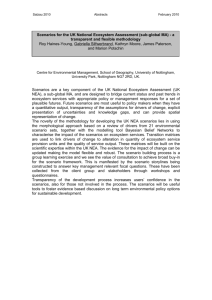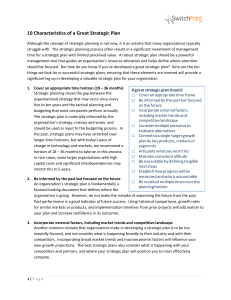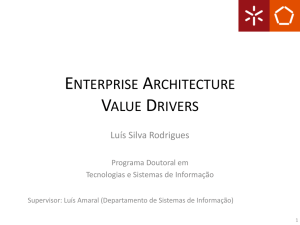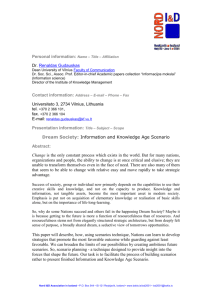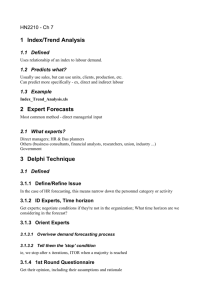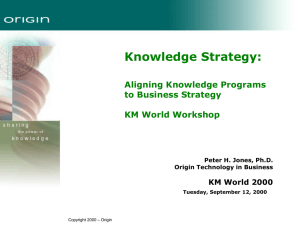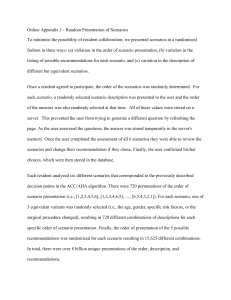Week 1 : Wednesday 6 October Lecturer: Jennifer Harper
advertisement
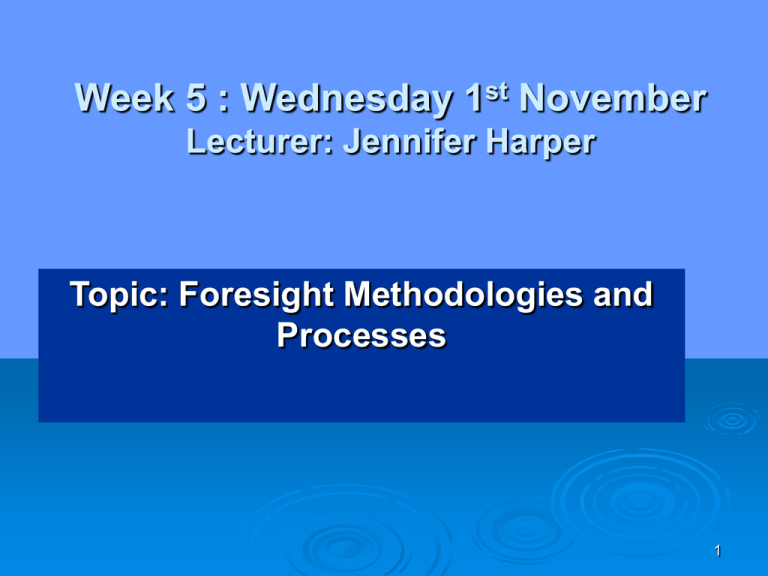
Week 5 : Wednesday 1st November Lecturer: Jennifer Harper Topic: Foresight Methodologies and Processes 1 Outline Introduction Popular tool mix Clustering of Methods by Task Categories of Methods Foresight and Forecasting Methodologies Scanning and mapping trends and drivers Scenarios Delphi 2 Popular Tools • • • • • • Expert panels Scenarios – baseline, success scenarios and disruption scenarios Horizon scanning On-line fora and delphi Creativity sessions Future Dialogues Popular Methods Worldwide (EFMN) Expert Panels 600,0 Questionnaire/ Survey Multi-use of Methods LiteratureReview 500,0 Interviews Brainstorming 400,0 TrendExtrapolation SWOTAnalysis 300,0 Modelling&simulation MegatrendAnalysis Scenarios 200,0 Key Technologies Futures Workshops 100,0 Essays Delphi Northern America LatinAmerica TransEurope Europeother EU-15+ TRM Australia Asia Africa 0,0 Clustering of Methods by Task 1. Methods to manage foresight ROAME (Rationale, Objectives, Activities, Monitoring and Evaluation) Set systems to document the process + outputs - The structures – steering committee 2. Pre-Foresight Methods Scoping Identifying stakeholders – co-nomination SWOT Benchmarking Environmental Scanning Adapted from Miles 2002 6 Clustering by Task 3. Foresight Generation Genius forecasting, Expert panels, Brainstorming, Mindmapping Relevance trees, cross-impact analysis, delphi, scenarios, trend extrapolation… Key technologies 4. Foresight action and renewal Action Plans, Demonstrators, Panel Embedding, Publications, Outreach Adapted from Miles 2002 7 Categories by Criteria Methods Quantitative methods (use of statistics and other data) to elaborate future trends and impacts − Qualitative methods (drawing on expert knowledge) to develop long term strategies − Methods to identify key points of action to determine planning strategies − Source: FOREN Guide Trend extrapolation − Simulation modelling − Cross impact analysis − System dynamics Delphi method − Experts panels − Brainstorming − Mindmapping − Scenario analysis workshops − SWOT analysis Critical/ key technologies − Relevance trees − Morphological analysis 8 Categories of Methods Exploratory methods (“outward bound”) start from the present and move forward to examine kinds of alternative future developments it can lead to. Look at implications of possible developments that lie outside familiar trends: What if methods Normative methods (“inward bound”) start with the creation of a preliminary view of possible (preferred) futures, then an analysis of how these futures may grow out of the present asking what trends and events would take us there or can be avoided. How methods. Source: Foren Guide 9 Foresight and forecasting methodologies Forecasting main tools: Traditional methods of extrapolation. econometric model based on mechanics and transposed to microeconomics and then macroeconomics. Simulation modelling Cross impact analysis System dynamics Foresight Main tools: Delphi method Expert panels Brainstorming Mindmapping Scenario analysis and building SWOT Critical technologies Relevance trees 10 Scanning for relevant trends and drivers Horizon scanning is…… Looking ahead – beyond usual timescales Looking across – beyond usual sources Seeing things you don’t normally see Source: Future Generation Beyond a single future to Implications for today’s decisions 11 Global External Trends Trends Issues Gearing Movement Fabienne Goux-Baudiment Namur, 01.06.18 ISSUES Internal Trends Local Past 12 Future Drivers (PEST /STEEPV) A framework to look for drivers, trends and impacts : Social Technological Economic Environmental Political Values 13 Societal An empowered ageing population Rising expectations …and increasing in developing economies …and an ageing crisis Under 20s declining in the UK Rising attainment A widening gender gap Emergence of the ethical economy More single households Global economic migration 14 Technological Mobile computing Lots of information Wireless cities Rise of the technologicall y superior learner Changing work and work places Changing decision making Changing business models MySpace AIM Blogs You Tube Second Life Skype 15 Increasing value of knowledge Economic Globalisation Mobile investment Open source and distributed manufacturing Importance of soft skills Labour mobility Co-opetition End of Doha? The economics of scarcity or of plenty? China …and America Rising dependency ratio Slow or rapid transition to retirement 16 Political Evolution of the EU Public service reform and Self improving competitiveness public services Rise of non state actors Culture change Policy divergence since devolution e-Democracy Step change in customer care Contract between state and citizen Single Issue everything Nanny state or light touch? Competing demands 17 Environmental Pressure to halt global warming Oil depletion Water Wars Quest for sustainability Carbon credits? Carbon neutral consumption Growth within environmental limits? Biofuels? Right to mobility? 18 SCAR Report: Major driving forces 19 Figure 1 DRIVERS OF CHANGE FOR HIGHER EDUCATION INTERNATIONALISATION International mobility International governance e-learning New entrants Competition Tuition fees Insufficient resources BUSINESS Globalisation Specialisation Differentiation Commercialisation Open innovation Business Cooperation RESEARCH New research technologies Student consumerism STUDENT NUMBERS Widening participation Demographic change Mapping Drivers Growth Liberalisation ICT convergence Relocation Eurozone Competitors Knowledge transfer Infectious diseases Food safety New technologies Energy Environment ICT application Malta 2015 finance Security Education MOST Economic IMPORTANT sustainability Survival Demand Global Market Customer expectations Social needs Ageing Health Infrastructure Networking Eliminate waste Cross Impact Matrix How does this affect this Top executives of high-profile corporations employ deceptive practices to rob shareholders. Top executives of high-profile corporations employ deceptive practices to rob shareholders. The forces of economic globalization make national borders permeable to commerce and enable free trade. Americans tend to value decentralized government. Permeable borders and free trade create more opportunities for deceptive business practices. Decentralized government weakens federal regulatory power and creates a divide and conquer phenomenon American support for decentralized government will promote laissezfaire trade while 22 accelerating trends The forces of Corporate economic malfeasance could globalization make make lawmakers national borders wary and incline permeable to them to impose http://ghost.rider.edu/cii/presen/matrix.doc commerce and barriers to FUTURE GENERATION How to get relevant evidence (3) Importance (visibility) Time Horizon 1: current and near V future. Many of the drivers shaping the near future are already locked into place and are visible - even if we sometimes still have to make sense of them Horizon 2: looking towards a further out future. Current trends are beginning to shape it, but its exact form is not yet clear. Early signals – and trends are beginning to emerge Horizon 3: the distant future. There are no discernable patterns and it is very difficult 23 separate signals from background noise. 24 Source: Hans Georg Graf FUTURE GENERATION Building scenarios • Key drivers of change • Uncertainties • Select key variables • Write the stories Using scenarios • Create dialogue • Identify research goals • Identify choices • Define strategy 25 Scenarios 'the description of a possible future and the corresponding path to it' (Godet) Exploratory (outward) What next? What if? Moving from present to the future Normative (inward) Where to? How to? Moving from future back to the present Normative scenarios describe preferred alternatives, e.g. Success scenario. Disruption scenarios depict deep breaks or even breakdown in current trends 26 GODET’s Scenarios Godet presents 5 basic attitudes to the future: 1. the “passive” ostrich (go with the flow) 2. the “reactive” firefighter (damage reduction) 3. the “preactive” insurer(accident prevention) 4. the “proactive” innovative conspirator (innovators) 5. the “anticipative” actor (blend of 2,3 &4) 27 Building scenarios 28 More consensual Scenario 1 Creative governance Individual identity Political/ economic Scenario 2 Communities unite Group identity Sociocultural Scenario 4 Chaos rules Scenario 3 Group rule Less democracy 29 SWOT Strengths Weaknesses Opportunities Threats Focus on current situation Expert teams in Scenario workshops and Delphi Based on interviews, statistical or benchmarking Main internal and external factors influencing strategies (or possible futures) in positive or negative ways. S: internal positive factors O: external positive factors W: internal negative factors T: external negative factors http://www.quickmba.com/strategy/swot/ 30 The Delphi Process 31 Chronology of delphi activity 32 Organising a Delphi Decide if appropriate method Define objectives Set up of expert panels (virtual?) Shift to use of On-line delphi, e.g. Euforia and Fistera projects Formulate statements Structure the fields and define topics Set criteria: time horizon (30 years), level of expertise, leader in this field, policy measures, open questions. Design questionnaire feedback to experts in second round final presentation of data to clients. Constraints: complex logistics, time resource intensive 33 Delphi Result:topic clusters Source: Kuhls, 2001 34 For discussion Choices re methods tend to reflect local competencies, international experiences, and, of course, objectives and orientation Decisions on methods can be devolved, e.g. to panels of experts, but this has its own problems and challenges. . . “The diversity in European foresight methodology makes for a rich pallet of techniques but it also leads to reinventing the wheel”. Discuss 35 References http://forera.jrc.es/fta/intro.html http://www.efmn.info http://cordis.europa.eu/foresight/home.htm http://www.eranet-forsociety.net/ForSociety http://www.costa22.org/ http://forlearn.jrc.es/index.htm http://www.unido.org/doc/12296 http://www.futurreg.net/ 36
